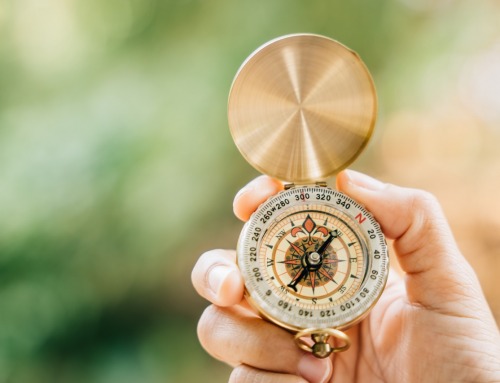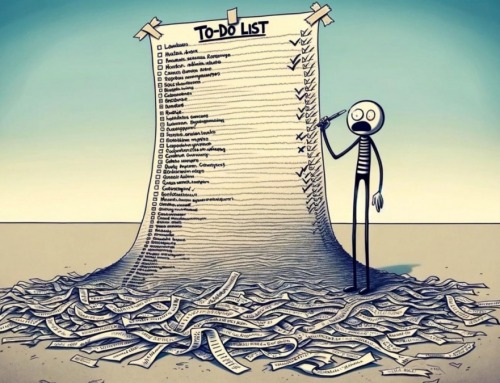“Big doors swing on small hinges.”
Sometimes, it’s the small things in life that can result in the biggest changes in life’s direction. One of the most effective things you can do for your life is to uncover your mission. It’s a small thing that consistently produces big results.
With the world constantly changing and morphing around us—most of us crave a consistent, personal, unchanging inner-core. Having a mission statement is more important than ever.
A mission statement process creates a path to that stillness, awareness, and mindfulness; and the mission statement itself helps to maintain that space, perspective, and inner-strength.
What’s a mission statement anyway?
In a nutshell, a mission statement serves to summarize the principles you want to live by.
By identifying your mission, you create a powerful statement that expresses, or explains, your sense of purpose and meaning in life. Your mission can act as a “governing constitution” by which you evaluate decisions and choose how you behave. It focuses on what you want to be, and what you want to do—and also the values and principles upon which being and doing are based.
Its purpose is to help you rise above the demands of your job or external circumstances and become aware of your inner-gifts, unique qualities, and characteristics. Even organizations have unique qualities and characteristics that can become powerful competitive advantages.
At the end of life…
You’re probably not going to be asked why you weren’t another Martin Luther King or Mother Teresa, or Aristotle. The question life will be asking is: Why weren’t you more you?
A mission statement helps you discover, develop, express, and maintain the who you are.
Highest and best use

When your vision, mission, values, and action plans are aligned, your direction is easy.
Real estate has a term: “highest and best use.” The phrase is used to appraise the value of property—and is it being utilized in the best way it can be.
A mission statement—and the process of creating one—helps you uncover your highest and best use.
Years ago, Robert Schuller, the televangelist, pastor, and author, spoke about the concept of, “if you knew you couldn’t fail, what would you give your life to?”
Viktor Frankl, the Austrian neurologist, psychiatrist, and Holocaust survivor said, “The thing I learned is that you don’t invent your mission, you detect it. You uncover it, as it were.”
A personal mission statement might sound like this…
“I lead my life centered around principles of excellence, empowerment, growth, and humility. I remember what is important in life, recognize my own and other’s strengths, and consistently work toward becoming my best-balanced self—for the benefit of myself and those around me.”
Mission statements can be long, or short. A brief one might be:
“Live, love, laugh.”
It’s not the length that matters—it’s as long as it takes for you to feel you’ve articulated what’s at your core. Which also means that mission statements are non-transferrable—only you can uncover what is yours.

Example: The PlanPlus Online mission statement.
There’s more productivity when there’s purpose
An organization can also uncover and articulate their mission statement. For example, the American Red Cross mission statement says:
“The American Red Cross, a humanitarian organization, …will provide relief to victims of disasters, and help people prevent, prepare for, and respond to emergencies.”
Who you are, and how you’ll express who you are
From these examples you can see that a mission statement should convey both ends and means—signifying your destination (purpose) and the way you want to get to your destination.
Author Os Guinness writes, “The search for the purpose of life is one of the deepest of our experiences as human beings.” He continues, “Deep in our hearts, we all want to find and fulfill a purpose bigger than ourselves, for each of us the real purpose is personal and passionate: to know what we are to do and why.”
How do you start?
Usually, a mission statement is written—although you can express it in the form of a picture or a powerful image. Writing is work—hard work. But writing down your mission statement is a strong, influential psychological process that imprints the brain. Words have a powerful impact in our lives, as well as in our relationships with other people. When you write, you have to think through your thoughts carefully.
To get that perspective, take time and be patient. Prepare to pay an enjoyable price in order to cultivate this sense of vision and purpose. Often, questions can help prompt you through the process. Ask yourself questions like:
- What’s truly important in my life?
- What would I really like to be and do in my life?
- What are my greatest strengths?
- What are my talents, possibilities, and true potential?
- If I had unlimited time and resources, what would I do?
- What are my deepest priorities?
- Which relationships do I wish to be lasting?
- Who is the one person who has made the greatest positive impact in my life?
- What must I do, and how must I manage my life, to constantly nurture these vital relationships?
Are mission statements relevant in this age of radical transformations and constant change?
We think they’re more relevant and important than ever.
Even in the world of 24/4, lights on, pop-up, full-throttle, most of us would give anything for some free time, some turn everything off time, some sit on the porch and rock time, some stare up at the stars time.
A mission statement connects you to your inner, unchanging self. A way for you to announce: This is me, and this is what I do.
You don’t need this to write a mission statement…
But it can help. Included in each edition of PlanPlus Online is a Mission Statement Builder to help you on the path to creating your mission statement. We have three editions:
PlanPlus Online Essentials for the busy individual
PlanPlus Online Business for the busy team, department, or business.
Each edition offers a 7-day free trial—certainly enough time to use the Mission Statement Builder. The next step is to take actions based on your mission statement—which is one of PlanPlus Online’s most important features.
Discover for yourself why you need a mission statement.







